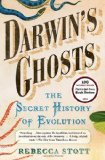Summary | Excerpt | Reviews | Beyond the Book | Readalikes | Genres & Themes | Author Bio

Critics' Opinion:
Readers' Opinion:
First Published:
Jun 2012, 416 pages
Paperback:
Mar 2013, 416 pages
 Book Reviewed by:
Book Reviewed by:
Lisa Guidarini
Buy This Book
This morning was no different. Darwin reached for the first letter from the top of the pile that his butler had arranged on his desk. The envelope was postmarked Redhill in Surrey. He tried to recall who he knew there, who might have sent the letter. Inside the envelope, he found a letter from Grece and a cutting from the Morning Star dated November 10, 1866. Grece explained that he was sending an oddity of nature for Darwin’s files in case it might be of use in the future. The newspaper headline read “freak of nature,” and the article described a pig that had apparently sloughed off its entire black and bristly skin from snout to tail in one mass in a single night, revealing underneath an entirely new mottled pink body. The pig was, the journalist recorded, apparently unperturbed by its night adventure and was eating as hungrily as before, oblivious to the scores of visitors who had flocked to see it. The owner had pinned the discarded skin to the door of the pig’s sty with a notice that read “Do not touch.” No natural philosopher, the letter writer complained, had yet been to see the pig. He encouraged Darwin to do so. He might be able to make sense of the unusual occurrence. “You may recollect me as having some year or two since pointed out to you a passage from Aristotle,” Grece wrote, “shewing that ‘Natural Selection’ was known to the ancients.” Grece was claiming his due, Darwin realized, as if having been placed in a footnote with Aristotle in the fourth edition of Origin were not reward enough. By 1866, Darwin was weighed down with a sense of the debts he owed to the hundreds of naturalists who sent him things. “Should you like to see the animal,” wrote Clair James Grece, town clerk of Redhill council, railway enthusiast, chronicler of the local sloughing practices of pigs, “it is on the premises of one Mr. Jennings, a baker, in Horley Row about one mile north of the Horley Station of the London and Brighton railway. A fly might not be procurable at that station, so that you might prefer to alight at the Redhill Station, where vehicles are readily obtainable, and whence it is about four miles to the southward.”
By the time Darwin’s “Historical Sketch” appeared in the fourth edition of Origin, it had been ten years in the making. Of the distribution of nationalities of these evolutionists, fourteen were British, nine French, six German, two American, one Italian, one Russian, one Austrian, one Estonian, one Belgian, and, if he were to count Aristotle, one an ancient Greek. A reviewer might easily have thought that Darwin was making a point about British superiority in the biological sciences. Yet only Darwin knew how little design there had been in the composition of the “Historical Sketch.” Only he knew the way in which certain names had been shoehorned in at the last minute and how doubtful he was about the status of some of those claimants, particularly the most recent additions.
Yet Darwin found the final distribution of nationalities pleasing. There were only nine Frenchmen as against fourteen British. Now he had finally proved once and for all that evolution was not an exclusively French idea, that it was not the spawn of French revolutionaries, part of a conspiracy to bring down the church and government and all social hierarchies. It was just as much the discovery of British clergymen, doctors, fruit farmers, and gentleman naturalists working away with microscopes in houses in the British provinces.
Darwin looked at the gaps in the list, too. That enormous gap between the first person on his list and the second—the Greek philosopher Aristotle and the eighteenth-century French naturalist Buffon—puzzled him. What had happened in that chasm of more than two thousand years? If Grece was right and Aristotle had begun to formulate vaguely evolutionary questions about the history of animals in 347 bc, even if they were only flickers of a vision he could not yet see clearly from his vantage point, what had happened to those embryonic ideas? Where had they disappeared to? Religious repression was too easy an answer; there were always freethinkers in a population of people, however repressed, however much they lived under the eye of censoring priests. There must have been transmutationists in that gap of two thousand years, he reflected. Perhaps they had disappeared beyond all historical record.
Excerpted from Darwin's Ghosts by Rebecca Stott. Copyright © 2012 by Rebecca Stott. Excerpted by permission of Spiegel & Grau, a division of Random House, Inc. All rights reserved. No part of this excerpt may be reproduced or reprinted without permission in writing from the publisher.





The House on Biscayne Bay
by Chanel Cleeton
As death stalks a gothic mansion in Miami, the lives of two women intertwine as the past and present collide.

The Flower Sisters
by Michelle Collins Anderson
From the new Fannie Flagg of the Ozarks, a richly-woven story of family, forgiveness, and reinvention.

The Funeral Cryer by Wenyan Lu
Debut novelist Wenyan Lu brings us this witty yet profound story about one woman's midlife reawakening in contemporary rural China.
Your guide toexceptional books
BookBrowse seeks out and recommends the best in contemporary fiction and nonfiction—books that not only engage and entertain but also deepen our understanding of ourselves and the world around us.